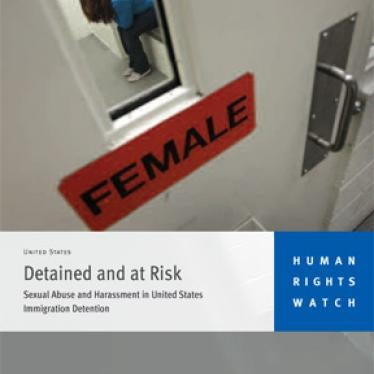Human Rights Watch submits these comments to the Department of Justice in response to its Notice of Proposed Rulemaking of February 3, 2011 regarding its Proposed Rule for National Standards To Prevent, Detect, and Respond to Prison Rape ("PREA standards").
Human Rights Watch has worked for years to draw the public's attention to sexual abuse in the nation's confinement facilities and to advocate for changes in policies and practices that would eliminate such abuse.[1] We strongly supported the National Prison Rape Elimination Act ("PREA") unanimously passed by Congress in 2003 and were honored to have a staff member serve as a commissioner on the National Prison Rape Elimination Commission created by PREA.[2] We believe that the standards authorized by PREA must provide clear and effective national guidelines to keep adults and juveniles in confinement safe from sexual abuse. Prison rape is an inexcusable and unacceptable violation of the basic rights of all people in detention. That it has been as prevalent as it is, as suggested by the Department's own calculation that 216,600 adults and youth were sexually abused in confinement facilities in 2008, reflects the failure of correctional agencies to take such abuse seriously and to adopt and enforce the policies necessary to end it.[3] Since PREA was enacted, many agencies have taken measures to reduce prison sexual abuse. But many lag behind. Whether because of lack of leadership, commitment, public support, or financial resources-or some combination thereof-too many facilities have not taken the steps necessary to end prison rape, as reflected in its continued prevalence. National standards remain as imperative today as when Congress called for their creation in 2003.
PREA set out a process for the development of such standards. First, it called for the creation of a National Prison Rape Elimination Commission (hereinafter the "Commission") that would research and issue a report on the causes and consequences of prison rape and also propose national standards for enhancing the detection, prevention, reduction, and punishment of prison rape. Those standards would be submitted to the Attorney General, who would within a year issue a final rule adopting national standards. According to the legislation, the Attorney General should issue final standards based on his "independent review, after giving due consideration" to standards proposed by the Commission and taking into account the instruction not to impose standards that would add substantial costs compared to current correctional costs. We think it clear from the process set out by Congress that it intended the Commission to undertake the extensive research and analysis necessary to develop effective, feasible standards and that those standards should not be weakened by the Attorney General unless they added "substantially" to current correctional costs.
The Department has worked hard on its proposed standards. Some of those standards clarify and strengthen the Commission's standards, and we welcome those changes. Others, however, significantly weaken the protections against prison rape proposed by the Commission. We understand the Department's desire to adopt standards that are logistically and financially feasible and that will have "buy in" from the correctional community. But it is inconsistent with the history of prison rape, as well as the goals of PREA, to propose standards that will not do the necessary job simply because weaker standards may be more palatable to some corrections agencies. Congress knew it was mandating change when it called for national standards. It knew that additional expenditures were inevitable. And it expected the Department to provide leadership within the corrections community, not retreat.
We urge the Department to review each of its draft standards against two criteria: first, whether it will advance the goal of preventing, detecting, reducing, and punishing prison rape more effectively than the Commission's proposed standards; and second, if not, whether a weakening of the Commission's standards is necessary to remain within limits of the "substantial" additional costs constraint.
[See attached document for complete comments.]
[1] Human Rights Watch, All too Familiar: Sexual Abuse of Women in U.S. State Prison (New York: Human Rights Watch, 1996); Human Rights Watch, No Escape: Male Rape in US Prisons (New York: Human Rights Watch, 2001) https://www.hrw.org/legacy/reports/2001/prison/; Human Rights Watch, Detained and at Risk: Sexual Abuse and Harassment in United States Immigration Detention, August 25, 2010, https://www.hrw.org/en/reports/2010/08/25/detained-and-risk-0.
[2] Jamie Fellner, senior advisor to the US Program of Human Rights Watch served as a commissioner with the National Prison Rape Elimination Commission. She is the principal author of these comments.
[3] Department of Justice, "Notice of Proposed Rulemaking, National Standards to Prevent, Detect, and Respond to Prison Rape," Federal Register, Vol. 76, No. 23, February 3, 2011, http://www.federalregister.gov/articles/2011/02/03/2011-1905/national-st... (accessed March 25, 2011), p. 6268, Table 1.






